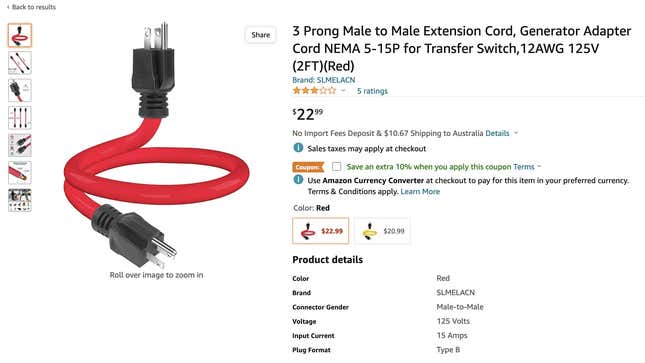
Electrical extension cords are tremendously useful for powering devices when your gadget’s power cord isn’t long enough to reach an electrical outlet. Normal extension cords have a so-called male plug that goes into the wall and a female plug at the end where you can plug in your device. There’s absolutely no reason for male-to-male extension cords to exist, but they do. And they’re available on Amazon, much to the exhaustion of federal safety regulators.
The U.S. Consumer Product Safety Commission issued a strange new warning on Thursday, telling consumers they should stop buying male-to-male extension cords on Amazon. The cords are apparently sold to people under the theory that plugging one end into a home’s electrical outlet and another end into a gas generator will get the home electrified. But you obviously should not do something this stupid.
“The extension cords have two male ends (a three-prong plug) and are generally used to ‘back-feed’ electricity to a residence during a power outage by connecting a generator to an outlet in the home. When plugged into a generator or outlet, the opposite end has live electricity posing a risk of serious shock or electrocution,” CPSC explained in a post on its website.
Again, don’t try to do this. It’s idiotic and unsafe. But CSPC felt it needed to make this warning explicit.
“Additionally, the flow of electric power in the direction reverse to that of the typical flow of power circumvents safety features of the home’s electrical system and can result in a fire. The short length of some of these cords also encourages use of a generator near the home, which could create a risk of carbon monoxide poisoning. Furthermore, these cords do not comply with applicable national safety codes, such as National Fire Protection Association 70 (NFPA 70),” the CPSC statement continues.
If you read reviews for these kinds of cords on Amazon, you’ll notice people calling them “suicide cords,” and with good reason. Stop buying these cords. They’re not safe.